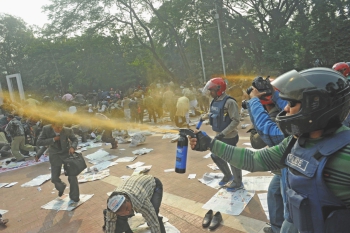| Home - Back Issues - The Team - Contact Us |
 |
| Volume 12 |Issue 04| January 25, 2013 | |
|
|
Impressions It Can't be Papered Over Shah Husain Imam
Use of pepper spray in two recent incidents has come under severe public criticism, and one would have thought, rightly so. The tool was ruthlessly applied during non-government teachers' agitation and the half-a-day hartal called by the left parties on Wednesday. The public outcry based on personal accounts of the harm done to the victims has been uproarious. The chilly spray irritates the eyes to cause tears, pain, and even temporary blindness. Its inflammatory effects cause the eyes to close, taking away vision, difficulty in breathing, runny nose, and coughing. The outcry became shriller following insensitive comments from the government side. The home minister has surprised many by his insensitive remarkes. He made two points: One, “pepper spray had been used earlier, is being used now and will continue to be used”; and two, “no one has any right to comment on pepper spray” as “it is one of the elements approved by the international convention to resist illegal demonstrations across the world.” Has the international convention approved it without any qualification or caveat? This is something to be gone into after the convention has been identified. The DMP commissioner in his briefing session with the journalists explained: "We are trying to avoid charging baton as journalists take photographs of such incidents and publish it in the media. As it tarnishes the image of police, we have bought pepper spray upon approval from the home ministry to make limited use of it for controlling unruly crowds and criminals." Interestingly, by alluding to journalists the DMP commissioner indirectly, maybe unwittingly, held them responsible for the introduction of pepper spray. By pulling the wool over the eye as to police's existing state of mob control capacity and blaming it out on journalists is taking resort to a convenient pretext. In any case, the use of pepper spray has tainted the law enforcers' image no less (perhaps more) than what baton charge would have caused. How can voicing demands be equated with criminality, one wonders? What is the threshold for the police to judge the unruliness of the crowd beyond which the tool will be used, we don't have any clue about it? Admittedly, some demonstrations turned violent lately 'requiring desperate medicine to be applied to a desperate disease', but how could teachers' sit-in or left party attempts at agitating over fuel price fall in the category of illegal activities? The basic question is, why give cause for agitation by preemptive strikes that only serve to inflame passions? Let there be police-public, and police-political parties interfaces to arrive at inviolable definition of what are peaceful means and what are violent methods. The DMP commissioner, however, admits, 'As it is not a Bangladeshi product, we have no experienced person or expert who can give opinion on it. Accordingly, there is no authority for its approval.' Why then use it? The matter has been taken to the court by a writ filed by Dr. Yunus Ali Akand, a lawyer of the Supreme Court. According to Article 35(5) in the Constitution, nothing causing injury to human body can be resorted to. Article 37 allows people to hold a meeting or to assemble with the purpose of having public grievances met. Police ordinance authorises 'mild lathi-charge' not amounting to infliction of any serious wound on a person. That which is said to be used to bring ferocious animals under control evidently should not be applied to human beings because it is too inhuman to use. The writer is Associate Editor, The Daily Star.
Copyright
(R) thedailystar.net 2013 |
